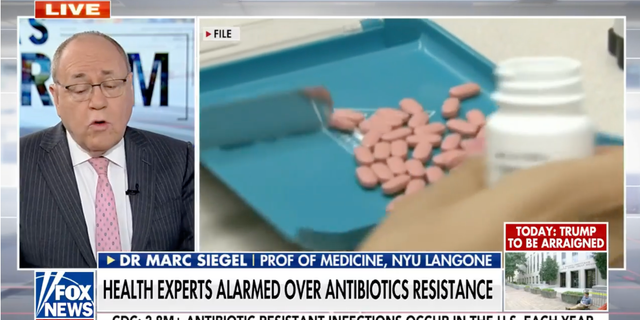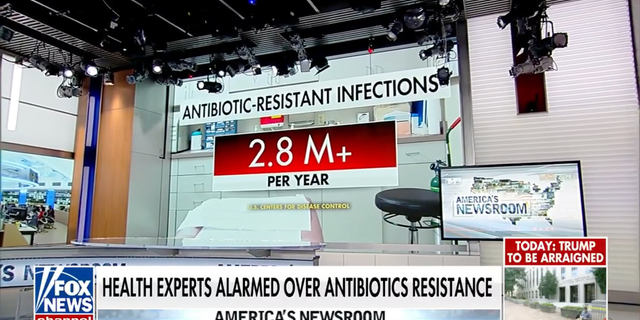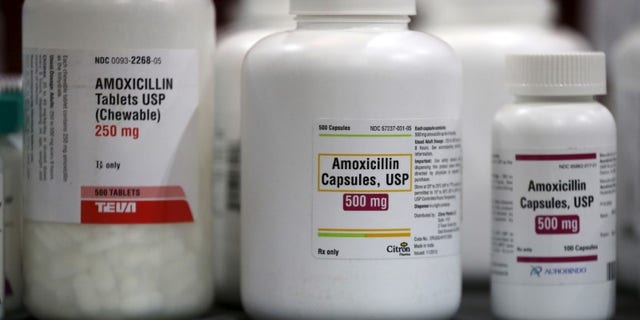Health
Antibiotic resistance is on the rise, doctor warns: ‘This is an enormous problem’

A growing number of Americans are building immunity to antibiotics, which can make them more vulnerable to illnesses and infections.
There are about 2.8 million antibiotic-resistant infections per year, according to the Centers for Disease Control and Prevention (CDC), which cause at least 35,000 annual deaths.
And those numbers are likely an understatement, according to Dr. Marc Siegel, a professor of medicine at NYU Langone Medical Center and a Fox News medical contributor.
WHY ANTIBIOTICS MAY NOT HELP PATIENTS SURVIVE THEIR VIRAL INFECTIONS: NEW RESEARCH
“We don’t always know that it caused the death, and we don’t always diagnose it,” he told Bill Hemmer and Dana Perino during an appearance on “America’s Newsroom.”
The World Health Organization (WHO) describes antibiotic resistance as “one of the biggest threats to global health, food security and development today,” according to its website.
Fox News medical contributor Dr. Marc Siegel warned of the worsening of antibiotic resistance during an appearance on “America’s Newsroom.” (iStock/Fox News)
“I’m famous for saying the WHO usually over-exaggerates things, but in this case, they’re right,” said Siegel.
“This is an enormous problem.”
One of the biggest drivers of antibiotic resistance is the lack of any new medications in recent decades, the doctor said.
‘SILENT PANDEMIC’ WARNING FROM WHO: BACTERIA KILLING TOO MANY PEOPLE DUE TO ANTIMICROBIAL RESISTANCE
“We haven’t developed a new class of antibiotics since the late 1980s,” he said.
“The drug companies don’t have an incentive to do this, because people only use antibiotics when they get sick, so there’s not much of a profit margin.”
Meanwhile, it costs $1.5 billion to create a new antibiotic, Siegel estimates, so the pharmaceutical companies are opting not to develop them.

One of the biggest drivers of antibiotic resistance is the lack of any new medications in recent decades, the doctor said. (Fox News)
Another potential cause of the dangerous resistance is that farms are overfeeding antibiotics to livestock, said Siegel.
The WHO recommends only giving antibiotics under the supervision of a veterinarian, and discourages using them to promote growth or to prevent diseases in healthy animals.
Another contributing factor is that doctors tend to overprescribe antibiotics, said Siegel.
“Every time we see someone with a sniffle, we’re giving them a Z-Pac. That causes more and more resistance.”
The CDC estimates that 30% of the time, antibiotics are overprescribed — but Siegel believes it’s actually double that amount.
“Every time we see someone with a sniffle, we’re giving them a Z-Pac,” he said. “That causes more and more resistance.”
There is pressure on doctors to write the prescription for antibiotics, even when it won’t help, Siegel said.

There are about 2.8 million antibiotic-resistant infections per year, according to the Centers for Disease Control and Prevention (CDC), which cause at least 35,000 annual deaths. (Fox News)
“Because they leave with a smile and a lollipop, versus me saying, ‘You have a virus and you’re going to get better on your own,’ and they go home more miserable,” the doctor said.
The pandemic also played a part in the worsening of the problem, he said.
“We missed a lot of this because we were so hyper-focused on COVID, and there was a lot of bacteria around then,” Siegel said.
CLICK HERE TO SIGN UP FOR OUR HEALTH NEWSLETTER
On the bright side, doctors will soon have better tools at their disposal, he predicts.
“We’re starting to get rapid tests for bacteria, so we can do a little swab and find out in five seconds … and then we’ll have more evidence on our side,” Siegel said.

The World Health Organization describes antibiotic resistance as “one of the biggest threats to global health, food security and development today.” (Reuters)
The Pasteur Act (Pioneering Antimicrobial Subscriptions to End Upsurging Resistance) has been in front of Congress since 2019, Siegel pointed out, but the legislation “keeps getting tabled.”
While the doctor said he’s generally “not for big government,” he believes there needs to be some federal involvement in creating new antibiotics.
“I remember all the antibiotics from my training days — they haven’t changed, and that’s troubling,” Siegel said.
“Almost every other thing I do is new, so I have to relearn. But with antibiotics, it’s the same old stuff.”
He added, “Bacteria is mutating, and we’re not mutating our treatments.”

Health
Jennifer Hudson Lost 80-Lbs Without Depriving Herself—Learn Her Secrets

Sign Up
Create a free account to access exclusive content, play games, solve puzzles, test your pop-culture knowledge and receive special offers.
Already have an account? Login
Use left and right arrow keys to navigate between menu items.
Use escape to exit the menu.
Health
Kennedy’s Plan for the Drug Crisis: A Network of ‘Healing Farms’

Though Mr. Kennedy’s embrace of recovery farms may be novel, the concept stretches back almost a century. In 1935, the government opened the United States Narcotic Farm in Lexington, Ky., to research and treat addiction. Over the years, residents included Chet Baker and William S. Burroughs (who portrayed the institution in his novel, “Junkie: Confessions of an Unredeemed Drug Addict”). The program had high relapse rates and was tainted by drug experiments on human subjects. By 1975, as local treatment centers began to proliferate around the country, the program closed.
In America, therapeutic communities for addiction treatment became popular in the 1960s and ’70s. Some, like Synanon, became notorious for cultlike, abusive environments. There are now perhaps 3,000 worldwide, researchers estimate, including one that Mr. Kennedy has also praised — San Patrignano, an Italian program whose centerpiece is a highly regarded bakery, staffed by residents.
“If we do go down the road of large government-funded therapeutic communities, I’d want to see some oversight to ensure they live up to modern standards,” said Dr. Sabet, who is now president of the Foundation for Drug Policy Solutions. “We should get rid of the false dichotomy, too, between these approaches and medications, since we know they can work together for some people.”
Should Mr. Kennedy be confirmed, his authority to establish healing farms would be uncertain. Building federal treatment farms in “depressed rural areas,” as he said in his documentary, presumably on public land, would hit political and legal roadblocks. Fully legalizing and taxing cannabis to pay for the farms would require congressional action.
In the concluding moments of the documentary, Mr. Kennedy invoked Carl Jung, the Swiss psychiatrist whose views on spirituality influenced Alcoholics Anonymous. Dr. Jung, he said, felt that “people who believed in God got better faster and that their recovery was more durable and enduring than people who didn’t.”
Health
Children exposed to higher fluoride levels found to have lower IQs, study reveals

The debate about the benefits and risks of fluoride is ongoing, as RFK Jr. — incoming President Trump’s pick for HHS secretary — pushes to remove it from the U.S. water supply.
“Fluoride is an industrial waste associated with arthritis, bone fractures, bone cancer, IQ loss, neurodevelopmental disorders and thyroid disease,” RFK wrote in a post on X in November.
A new study published in JAMA Pediatrics on Jan. 6 found another correlation between fluoride exposure and children’s IQs.
RFK JR. CALLS FOR REMOVAL OF FLUORIDE FROM DRINKING WATER, SPARKING DEBATE
Study co-author Kyla Taylor, PhD, who is based in North Carolina, noted that fluoridated water has been used “for decades” to reduce dental cavities and improve oral health.
Fluoride exposure has been linked to a variety of negative health effects, yet benefits oral health. (iStock)
“However, there is concern that pregnant women and children are getting fluoride from many sources, including drinking water, water-added foods and beverages, teas, toothpaste, floss and mouthwash, and that their total fluoride exposure is too high and may affect fetal, infant and child neurodevelopment,” she told Fox News Digital.
The new research, led by scientists at the National Institute of Environmental Health Sciences (NIEHS), analyzed 74 epidemiological studies on children’s IQ and fluoride exposure.
FEDERAL JUDGE ORDERS EPA FURTHER REGULATE FLUORIDE IN DRINKING WATER DUE TO CONCERNS OVER LOWERED IQ IN KIDS
The studies measured fluoride in drinking water and urine across 10 countries, including Canada, China, Denmark, India, Iran, Mexico, Pakistan, New Zealand, Spain and Taiwan. (None were conducted in the U.S.)
The meta-analysis found a “statistically significant association” between higher fluoride exposure and lower children’s IQ scores, according to Taylor.
“[It showed] that the more fluoride a child is exposed to, the more likely that child’s IQ will be lower than if they were not exposed,” she said.

Scientists found a “statistically significant association” between higher fluoride exposure and lower children’s IQ scores. (iStock)
These results were consistent with six previous meta-analyses, all of which reported the same “statistically significant inverse associations” between fluoride exposure and children’s IQs, Taylor emphasized.
The research found that for every 1mg/L increase in urinary fluoride, there was a 1.63-point decrease in IQ.
‘Safe’ exposure levels
The World Health Organization (WHO) has established 1.5mg/L as the “upper safe limit” of fluoride in drinking water.
“There is concern that pregnant women and children are getting fluoride from many sources.”
Meanwhile, the U.S. Public Health Service recommends a fluoride concentration of 0.7 mg/L in drinking water.
“There was not enough data to determine if 0.7 mg/L of fluoride exposure in drinking water affected children’s IQs,” Taylor noted.
FDA BANS RED FOOD DYE DUE TO POTENTIAL CANCER RISK
Higher levels of the chemical can be found in wells and community water serving nearly three million people in the U.S., the researcher noted.
She encouraged pregnant women and parents of small children to be mindful of their total fluoride intake.

Nearly three million people have access to wells and community water with fluoride levels above the levels suggested by the World Health Organization. (iStock)
“If their water is fluoridated, they may wish to replace tap water with low-fluoride bottled water, like purified water, and limit exposure from other sources, such as dental products or black tea,” she said.
“Parents can use low-fluoride bottled water to mix with powdered infant formula and limit use of fluoridated toothpaste by young children.”
For more Health articles, visit www.foxnews.com/health.
While the research did not intend to address broader public health implications of water fluoridation in the U.S., Taylor suggested that the findings could help inform future research into the impact of fluoride on children’s health.
Dental health expert shares cautions
In response to this study and other previous research, Dr. Ellie Phillips, DDS, an oral health educator based in Austin, Texas, told Fox News Digital that she does not support water fluoridation.

The study researcher encouraged parents of small children to be mindful of their total fluoride intake. (iStock)
“I join those who vehemently oppose public water fluoridation, and I question why our water supplies are still fluoridated in the 21st century,” she wrote in an email.
“There are non-fluoridated cities and countries where the public enjoy high levels of oral health, which in some cases appear better than those that are fluoridated.”
CLICK HERE TO SIGN UP FOR OUR HEALTH NEWSLETTER
Phillips called the fluoride debate “confusing” even among dentists, as the American Dental Association (ADA) advocates for fluoride use for cavity prevention through water fluoridation, toothpaste and mouthwash — “sometimes in high concentrations.”

Fluoride is used in water, toothpaste and mouthwash to help prevent cavities. (iStock)
“[But] biologic (holistic) dentists generally encourage their patients to fear fluoride and avoid its use entirely, even if their teeth are ravaged by tooth decay,” she said.
“Topical fluoride is beneficial, while systemic consumption poses risks.”
Phillips encouraged the public to consider varying fluoride compounds, the effect of different concentrations and the “extreme difference” between applying fluoride topically and ingesting it.
“Topical fluoride is beneficial, while systemic consumption poses risks,” she cautioned.
“Individuals must take charge of their own oral health using natural and informed strategies.”
The study received funding from the National Institute of Environmental Health Sciences (NIEHS), the National Institutes of Health (NIH) and the Intramural Research Program.
-
/cdn.vox-cdn.com/uploads/chorus_asset/file/25822586/STK169_ZUCKERBERG_MAGA_STKS491_CVIRGINIA_A.jpg)
/cdn.vox-cdn.com/uploads/chorus_asset/file/25822586/STK169_ZUCKERBERG_MAGA_STKS491_CVIRGINIA_A.jpg) Technology1 week ago
Technology1 week agoMeta is highlighting a splintering global approach to online speech
-

 Science1 week ago
Science1 week agoMetro will offer free rides in L.A. through Sunday due to fires
-
/cdn.vox-cdn.com/uploads/chorus_asset/file/23935558/acastro_STK103__01.jpg)
/cdn.vox-cdn.com/uploads/chorus_asset/file/23935558/acastro_STK103__01.jpg) Technology7 days ago
Technology7 days agoAmazon Prime will shut down its clothing try-on program
-

 News1 week ago
News1 week agoMapping the Damage From the Palisades Fire
-
/cdn.vox-cdn.com/uploads/chorus_asset/file/25826211/lorealcellbioprint.jpg)
/cdn.vox-cdn.com/uploads/chorus_asset/file/25826211/lorealcellbioprint.jpg) Technology6 days ago
Technology6 days agoL’Oréal’s new skincare gadget told me I should try retinol
-
/cdn.vox-cdn.com/uploads/chorus_asset/file/25832751/2192581677.jpg)
/cdn.vox-cdn.com/uploads/chorus_asset/file/25832751/2192581677.jpg) Technology3 days ago
Technology3 days agoSuper Bowl LIX will stream for free on Tubi
-

 Business4 days ago
Business4 days agoWhy TikTok Users Are Downloading ‘Red Note,’ the Chinese App
-
/cdn.vox-cdn.com/uploads/chorus_asset/file/25835602/Switch_DonkeyKongCountryReturnsHD_scrn_19.png)
/cdn.vox-cdn.com/uploads/chorus_asset/file/25835602/Switch_DonkeyKongCountryReturnsHD_scrn_19.png) Technology1 day ago
Technology1 day agoNintendo omits original Donkey Kong Country Returns team from the remaster’s credits














